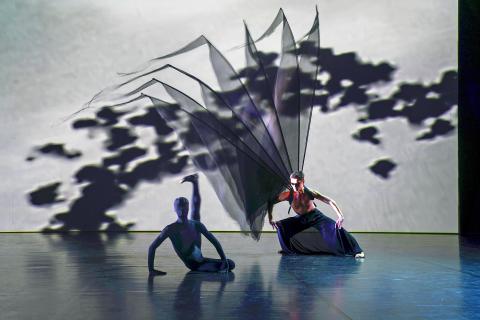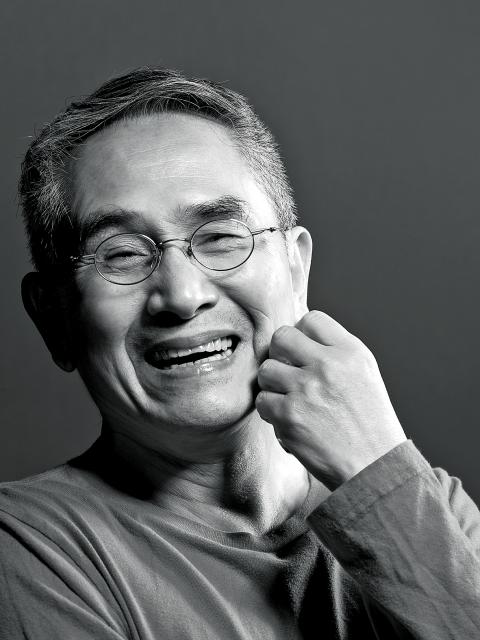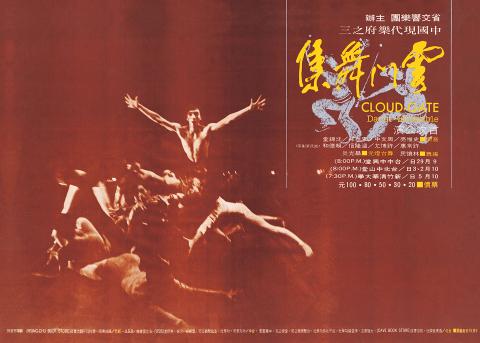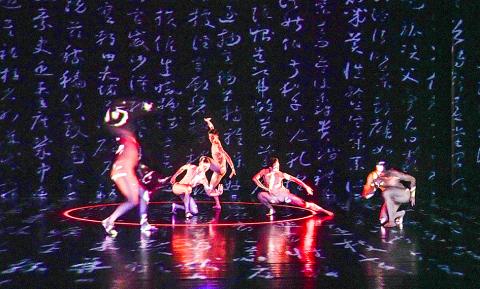Cloud Gate Dance Theatre (雲門舞集) artistic director Lin Hwai-min (林懷民) is still more than a year away from retirement, but the company and its fan base have already begun the long goodbye to a man who took his dream of a small company and produced not only a world-renowned troupe and major ambassador for the nation, but along the way helped propel Taiwan into a powerhouse of contemporary dance.
Lin forged a new path for dancers in the Chinese-speaking world by establishing the first professional company in Taiwan. The company is now celebrating its 45th anniversary, and its annual fall tour of the nation is a special gala program of highlights of the past 20 years of Lin’s works.
No one could be more surprised about reaching such a milestone than Lin himself, as he said in a telephone interview earlier this month.

Photo courtesy of Liu Chen-Hsiang
He was already a published author before entering National Chengchi University to study journalism. He left Taiwan in 1969 to study at the University of Missouri, but switched to the University of Iowa after winning a fellowship to its International Writing Program.
While he had taken some dance classes growing up, despite his father’s disapproval, it was not until age 23, while in the US, that he had the opportunity and the time to take classes regularly.
When he returned to Taiwan, he wanted to continue to dance, so he gathered a group of like-minded people, even though none of them had professional experience.

Photo courtesy of Barry Lam
Lin has said he never intended to become a choreographer; the idea was that the group would eventually be able to hire choreographers to create works for them, but in the meantime, he would try his hand. He had to teach himself how to choreograph.
However, one thing Lin and his first dancers agree on was that they wanted works that reflected their own culture, not just imitate Western modern dance. The inspiration for many Lin’s early works came from classical Chinese literature — such as The Dream of the Red Chamber (紅樓夢) — folktales and traditional theater.
The troupe’s relationship with Taiwan was cemented just five years later, in 1978, with Legacy (薪傳), the first performance of which came just as the US broke relations with Taiwan.

Photo courtesy of Cloud Gate Dance Theatre
The attachment, the feeling of ownership that Taiwanese have for Cloud Gate, its dancers and Lin, is probably unique in the world. Many countries have national troupes, but they have not been taken to heart in quite the same way.
Lin said people are always telling him about the first time they saw the company, stopping him on the street or at the theater or when he is shopping.
“When I bought the trees for the theater [in Tamsui], we saw two people jumping around back in the trees. The couple came up to talk and the wife said her husband would always buy expensive tickets to see Cloud Gate when they were dating, but after they were married he didn’t and they stopped going,” he said. “Grannies tell me about taking their grandchildren to see the company.”

Photo courtesy of Liu Chen-Hsiang
For the 45th anniversary gala program, Lin said he picked the pieces that his dancers were most comfortable with, and ones that would showcase his senior dancers, six of whom are retiring at the end of this year.
Some have been in the company for 25 years, such as Chou Chang-ning (周章佞) and Yang I-chun (楊儀君), while Tsai Ming-yuan (蔡銘元) has 19 years, Huang Pei-hua (黃珮華) and Su I-ping (蘇依屏) have 17 each and Ko Wan-chun (柯宛均) has 14.
They are the third and fourth generations of Cloud Gate dancers and they anchored the company in the early 1990s, Lin said.
“They all still love dancing, but they are tired of touring,” he said.
He said there also pieces that he wanted to put in the show, but could not, such as the end of Legacy, because the dancers have to paint their bodies black for that part, which means they could not do another piece afterwards.
“It would be nice to do the really ancient works, but hard to find the time to rehearse them. We would have had to stop everything else … we just don’t have the time,” he said, referring to the company’s busy touring schedule over the past year.
As for the line-up, “who goes first, when they go out, also depended on what else they are doing, as well as the set and costume changes,” he said.
The program will open with Chou’s solo on the character for eternal (永) from 2001’s Cursive (行草) and ends with the finale of Pine Smoke (松煙) from 2003.
In between there are a mix of solos, duets and group pieces from 2001’s Bamboo Dream (竹夢), 1997’s Portrait of the Families (家族合唱), 1998’s Moon Water (水月), 2014’s White Water (白水), 2011’s How Can I Live On Without You (如果沒有你), 2013’s Rice (稻禾) and 2006’s Wind Shadow (風.影).
The selection not only highlights the virtuosity of the dancers, but shows the variety techniques that Lin developed over the years.
“All my works are simple,” Lin said.
Many people would beg to differ.
Cloud Gate is opening its national tour at the National Theater in Taipei tomorrow night, the first of nine performances, before traveling to Taichung, Kaohsiung and Tainan.
Tickets sold fast as soon as the tour was announced this summer and there are only a few seats left.
As part of the 45th anniversary celebrations, an exhibition of the company’s posters for performances in Taiwan and overseas tours opened earlier this month at the Cloud Gate Theater in New Taipei City’s Tamsui District (淡水) and runs through Dec. 30.

Taiwan has next to no political engagement in Myanmar, either with the ruling military junta nor the dozens of armed groups who’ve in the last five years taken over around two-thirds of the nation’s territory in a sprawling, patchwork civil war. But early last month, the leader of one relatively minor Burmese revolutionary faction, General Nerdah Bomya, who is also an alleged war criminal, made a low key visit to Taipei, where he met with a member of President William Lai’s (賴清德) staff, a retired Taiwanese military official and several academics. “I feel like Taiwan is a good example of

March 2 to March 8 Gunfire rang out along the shore of the frontline island of Lieyu (烈嶼) on a foggy afternoon on March 7, 1987. By the time it was over, about 20 unarmed Vietnamese refugees — men, women, elderly and children — were dead. They were hastily buried, followed by decades of silence. Months later, opposition politicians and journalists tried to uncover what had happened, but conflicting accounts only deepened the confusion. One version suggested that government troops had mistakenly killed their own operatives attempting to return home from Vietnam. The military maintained that the

Before the last section of the round-the-island railway was electrified, one old blue train still chugged back and forth between Pingtung County’s Fangliao (枋寮) and Taitung (台東) stations once a day. It was so slow, was so hot (it had no air conditioning) and covered such a short distance, that the low fare still failed to attract many riders. This relic of the past was finally retired when the South Link Line was fully electrified on Dec. 23, 2020. A wave of nostalgia surrounded the termination of the Ordinary Train service, as these train carriages had been in use for decades

Lori Sepich smoked for years and sometimes skipped taking her blood pressure medicine. But she never thought she’d have a heart attack. The possibility “just wasn’t registering with me,” said the 64-year-old from Memphis, Tennessee, who suffered two of them 13 years apart. She’s far from alone. More than 60 million women in the US live with cardiovascular disease, which includes heart disease as well as stroke, heart failure and atrial fibrillation. And despite the myth that heart attacks mostly strike men, women are vulnerable too. Overall in the US, 1 in 5 women dies of cardiovascular disease each year, 37,000 of them